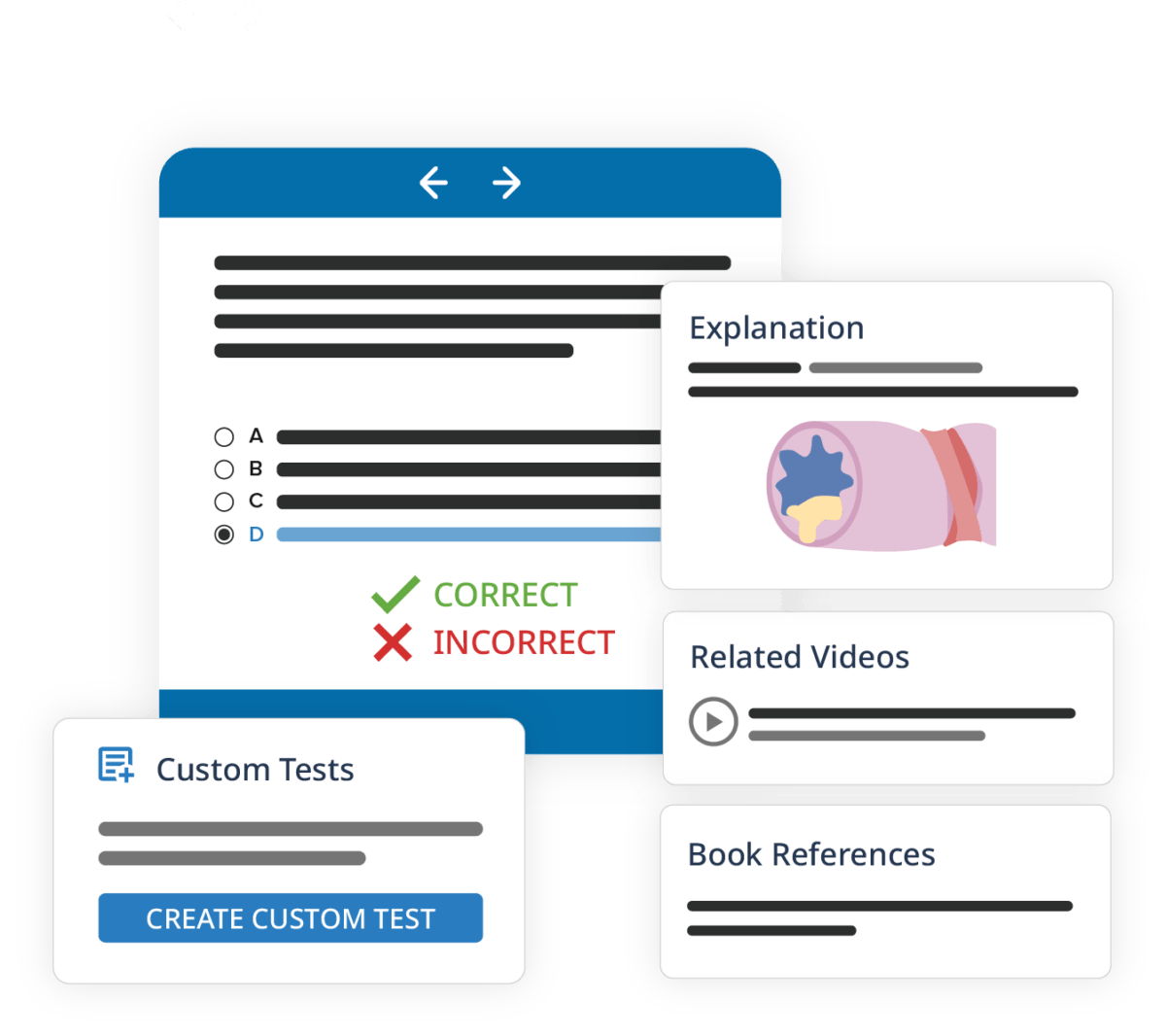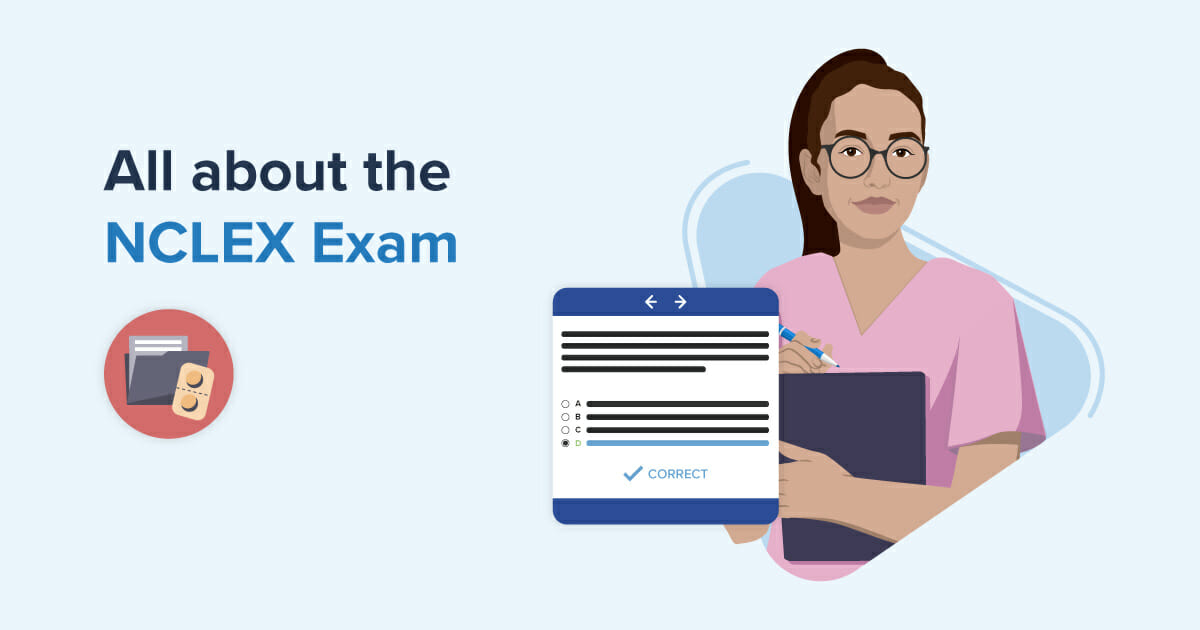For the nursing grads, repeat test-takers, international nurses, and anyone who needs a last-minute NCLEX plan that’s going to help you pass, here it is. We’re going to give you a realistic day-by-day schedule, focus topics to master, common pitfalls to avoid, and the best way to use practice questions.
Why a 30-Day NCLEX Plan Can Work
Did you know that a well-structured 30-day plan can be more effective than months of unorganized, passive study? This is even more true when your plan takes into account your study style. Studying to pass means you need to use your time strategically, and not just put in the hours. The right plan helps you focus on what’s most important.
This 30-day plan includes evidence-based techniques like spaced repetition, which boosts memory by revisiting content at the right intervals, and active recall, which helps with retention by forcing your brain to retrieve information rather than just reading it on repeat. It also uses concept mapping to organize ideas visually, video-based learning to engage multiple senses, and question-based learning to practice application. When you use these well, you study smarter, not harder (or longer) in the final stretch before your exam.

The 30-Day NCLEX Study Plan (Week-by-Week Breakdown)
Now that you know why a 30-day study plan works, let’s break down how to use it. The next four weeks are all about structure and progress. Here’s how to tackle your NCLEX prep one week at a time.
Week 1: Fundamental Concepts, Lab Values, And Vital Signs
Begin your 30-day plan by establishing a strong foundation. The core concepts are the building blocks for everything else you’ll study. They’re frequently tested on the NCLEX, not only as direct questions but also as clinical scenarios. Mastering them early sets you up to master more complex topics later on.
Lab values and vital signs
Lab values and vital signs are high-yield. They’re often used as clues in clinical situations, so it’s not enough to just memorize numbers. Focus on:
- What abnormal values indicate, and how they guide nursing decisions
Use spaced repetition to reinforce ranges over time. Incorporate active recall techniques like flashcards, quizzes, and short daily reviews to strengthen retention.
Infection control and isolation precautions
Next, move on to infection control and isolation precautions, another NCLEX favorite. Make sure you understand:
- Types of transmission: contact, droplet, airborne
- Appropriate PPE
- Donning/doffing sequence
- Patient room assignments based on isolation type
Concept mapping and visual flowcharts can be beneficial here.
Basic nursing skills
By the end of Week 1, make time to review basic nursing skills. This topic is a commonly underestimated area that often appears in prioritization and delegation questions. Focus on:
- Patient positioning and mobility (e.g., post-op positioning, fall risk)
- Safety and hygiene protocols
- Standard procedures like vital sign monitoring and specimen collection
Video-based learning can reinforce clinical techniques, and daily practice questions (at least 100) will build clinical judgment.
Reinforce with Lecturio
Build a rock‑solid foundation with Lecturio’s Fundamentals of Nursing Theory course, covering lab values, vital signs, and core nursing concepts in depth. Pair it with some of our cheat sheets for quick reference. These resources can help you reinforce your week 1 goals and make it easier to connect knowledge to clinical scenarios.
Week 2: Pharmacology Power Week
Start week 2 by focusing on pharmacology. It’s one of the most challenging yet high-impact areas of NCLEX prep. Medications appear in every nursing specialty and are often hidden in clinical scenarios. Building confidence here will pay off across the entire exam.
Common drug classes
In the NCLEX, pharma is less about memorizing every drug name and more about recognizing drug classes and their shared actions, uses, and safety concerns. Focus on:
- The therapeutic purpose of each class
- Prototype drugs as examples
- Mechanisms of action in simple terms
Use spaced repetition to revisit drug classes, and active recall to test yourself.
Side effects, contraindications, and nursing interventions
Know the high-alert side effects that require immediate intervention, and which conditions make a drug unsafe to give. Pair this with the nursing interventions that keep patients safe during treatment. Examples include:
- Recognizing signs of toxicity or allergic reaction
- Monitoring required lab values before administration
- Educating patients on precautions
Using must-know cheat sheets will help consolidate this information for quick reference.
Medication calculations
Calculation errors can cost lives!
Review dosage formulas, drip rates, and unit conversions until they feel second nature. Use practice questions to strengthen both speed and accuracy, simulating real test conditions.
Reinforce with Lecturio
Video-based learning can make complex pharmacology concepts easier to digest. Lecturio’s Pharmacology Crash Course is ideal for reinforcing visual connections between drugs and their effects. End each day with 100–125 medication-focused questions to reinforce your knowledge.
Take the Course: Pharmacology
Confidently tackle one of the toughest topics in nursing school.
Week 3: Clinical Judgment, Prioritization & Delegation
This week is about sharpening your ability to think like a safe, effective nurse under pressure. The NCLEX questions in this area test your ability to recognize the most urgent problems, assign care appropriately, and act within ethical and legal boundaries. Strong clinical judgment can often be the deciding factor between two answer choices that both seem correct.
ABCs, Maslow’s, and safety-first frameworks
The NCLEX relies heavily on priority-setting frameworks to assess whether you can make safe decisions in real clinical situations. Be confident in:
- ABCs (Airway, Breathing, Circulation) as your primary guide
- Maslow’s Hierarchy of Needs for prioritizing beyond immediate physical threats
- Safety-first principles, especially when physical or medication-related harm is possible
Practice applying these frameworks with a timed 75-question test each day to build both speed and confidence in exam-like conditions.
Delegation, supervision, and teamwork
Delegation questions test your understanding of the scope of practice and the ability to match tasks to the right team member. Focus on:
- Which tasks can be safely assigned to LPNs/LVNs or UAPs
- When direct RN supervision is required
- How to communicate and follow up on delegated tasks
Breaking down rationales from your daily practice questions into a dedicated study journal will make this easier to retain and review later. Concept mapping can also help you visualize who does what in the healthcare team.
Ethical/legal scenarios
These questions assess your understanding of patient rights, informed consent, confidentiality, and professional accountability. Review common ethical dilemmas, as well as state and national nursing practice standards, and practice working through them in test format to strengthen your decision-making process.
Reinforce with Lecturio
Solidify these skills with Lecturio’s Prioritization NCLEX Question Walkthrough, which guides you through patient-triage scenarios. Pair it with a NCLEX‑RN Study Plan for management of care, delegation, and ethical decision‑making.
Week 4: Full Review & Practice Exam Simulation
The final week is about pulling everything together. At this stage, you’re reinforcing what you’ve learned, fine‑tuning your timing, and building the mental stamina you’ll need for exam day. Think this week as the NCLEX “dress rehearsal.”
Full‑length practice exams
During this week, you need to simulate the real NCLEX experience. Complete a timed full‑length mock exam every three days. This helps you get used to the pacing and endurance required for six hours of testing. After each practice exam, review rationales for both correct and incorrect answers. This is where your most important learning will happen.
Targeting weak areas
Use your practice exam results to identify your weak areas and spend some extra time on them. Revisit your study journal from previous weeks and go over any topics you’ve consistently struggled with. This isn’t the time to add new content. During this time, you should be sharpening what you already know.
Test‑day readiness
To have a successful NCLEX, you need focus, energy, and confidence. In your final days:
- Slightly reduce your study time to avoid burnout
- Keep reviewing high‑yield topics like lab values, pharmacology, prioritization frameworks, and delegation rules
Reinforce with Lecturio
Bring it all together with Lecturio’s NCLEX Question Walkthroughs and full‑length practice exams from the NCLEX‑RN Study Plan. These resources allow you to simulate real testing conditions, review rationales, and strengthen your clinical judgment, so that you walk into your NCLEX feeling well-prepared.
Final Week NCLEX Tips: What to Do Before Test Day
In your last few days, keep it light. This isn’t the time for cramming. Do quick reviews of high‑yield topics and your weak areas. Schedule your final full‑length mock exam about three to four days before test day to fine‑tune your timing and spot your weaknesses, then spend the remaining time reinforcing the most important topics.
Get your test‑day kit ready, including your ID, snacks, water, and directions to the test center, so nothing rattles you on the morning of your exam. And don’t underestimate the power of your mindset. Practice positive visualization and a few slow, steady breathing exercises to help you walk in calm, focused, and ready to think like a nurse.
Daily NCLEX Practice: How Much Is Enough?
Aim for 100–125 NCLEX‑style questions a day. Remember, quality is more important than quantity. The real value comes from understanding why each answer is right or wrong and learning from those rationales. Mix in timed practice blocks of around 75 questions in a quiet space, without notes, to mimic real test conditions. This not only sharpens your pacing but also trains your brain to think under exam‑day pressure.
High-Yield NCLEX Topics You Must Master
Some topics appear so often on the NCLEX that they’re important to revisit again and again. Mastering these will give you a strong edge on exam day.
- Lab values: Normal ranges and “red flag” values
- Delegation & Scope of Practice: What RNs, LPNs, and UAPs can and cannot do
- Priority‑setting frameworks: ABCs, safety first, and acute vs. chronic care
- Pharmacology: Top 50 must‑know drugs, antidotes, and side effects
- Maternity, Mental Health, and Pediatrics: Frequently tested scenarios and care priorities
How to Avoid Common NCLEX Pitfalls
Even an air-tight study plan can fall flat if you slip into common traps. One of the biggest is cramming without review. Information fades quickly if you don’t take time to understand the why behind it. When you review test questions, don’t just focus on your incorrect answers. Go over your correct answers, too. This helps to make sure you understand the reasoning and didn’t just guess right.
Another major mistake is skipping practice questions altogether. The NCLEX doesn’t just test knowledge. It tests how you apply that knowledge under pressure. The more you practice, the more comfortable you’ll be with how questions are asked.
Be mindful of burnout, too. Marathon 12‑hour study days may feel productive, but they usually aren’t. Short, focused sessions will help you retain more.
Finally, don’t forget to practice in test conditions. Use timed blocks, a quiet space, and don’t refer to your notes. Building stamina now will make the real exam feel far less intimidating.
Top Tools & Resources That Can Help
Some tools can make your 30‑day NCLEX study plan more effective. Here are some of the best resources to keep you focused and organized.
Lecturio’s NCLEX Prep Course
Structured video lessons, Qbanks, and daily study goals make this a strong all‑in‑one prep option. These include detailed rationales and proven test‑taking strategies to boost your knowledge.
NCLEX Sample Questions
Practice with realistic, computer‑adaptive‑style questions that closely mirror the real exam. Include daily question goals and instant rationales to help you learn from both correct and incorrect answers.
Bonus Tools
- Additional Qbanks: UWorld, Archer Review, or Kaplan
- NCLEX Flashcards: Picmonic or Quizlet
- Time‑tracking & focus apps: Forest or Pomofocus
- Printable study schedule/checklist: Create your own or download one from reputable nursing study blogs or Lecturio’s study resources
Conclusion: You’ve Got This
You don’t need endless study marathons to pass the NCLEX. You need to study smart, stay focused, and trust the process. Over the final 30 days, build a plan around high‑yield content, evidence-based learning strategies, and consistent practice.
Stick with it, keep refining your weak areas, and walk into exam day feeling more than prepared.





